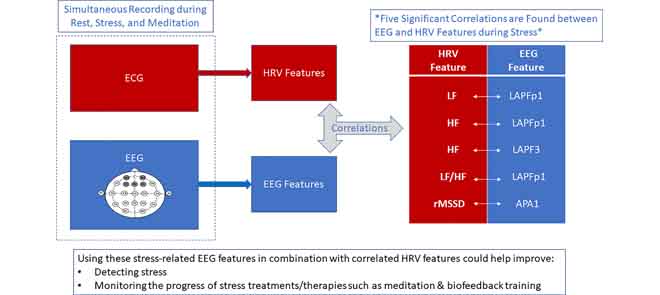Objective: Stress is a significant risk factor for various diseases such as hypertension, heart attack, stroke, and even sudden death. Stress can also lead to psychological and behavioral disorders. Heart rate variability (HRV) can reflect changes in stress levels while other physiological factors, like blood pressure, are within acceptable ranges. Electroencephalogram (EEG) is a vital technique for studying brain activities and provides useful data regarding changes in mental status. This study incorporates EEG and a detailed HRV analysis to have a better understanding and analysis of stress. Investigating the correlation between EEG and HRV under stress conditions is valuable since they provide complementary information regarding stress. Methods: Simultaneous electrocardiogram (ECG) and EEG recordings were obtained from fifteen subjects. HRV /EEG features were analyzed and compared in rest, stress, and meditation conditions. A one-way ANOVA and correlation coefficient were used for statistical analysis to explore the correlation between HRV features and features extracted from EEG. Results: The HRV features LF (low frequency), HF (high frequency), LF/HF, and rMSSD (root mean square of the successive differences) correlated with EEG features, including alpha power band in the left hemisphere and alpha band power asymmetry. Conclusion: This study demonstrated five significant relationships between EEG and HRV features associated with stress. The ability to use stress-related EEG features in combination with correlated HRV features could help improve detecting stress and monitoring the progress of stress treatments/therapies. The outcomes of this study could enhance the efficiency of stress management technologies such as meditation studies and bio-feedback training.

